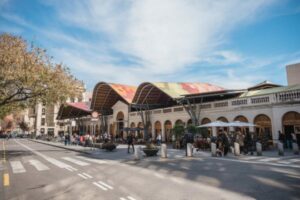Last Updated on November 15, 2025 by Emma Fajcz | Published: November 11, 2019
It’s no secret that Barcelona has been making headlines for their politics for a long time.
If you’re planning a trip to Barcelona, sometimes the images you see on the news might seem confusing at best and downright scary at worst. But fear not—we can assure you that Barcelona is—and always has been—a safe place to visit.
Editor’s Note: This Q&A took place as a Facebook Live video on October 31, 2019.
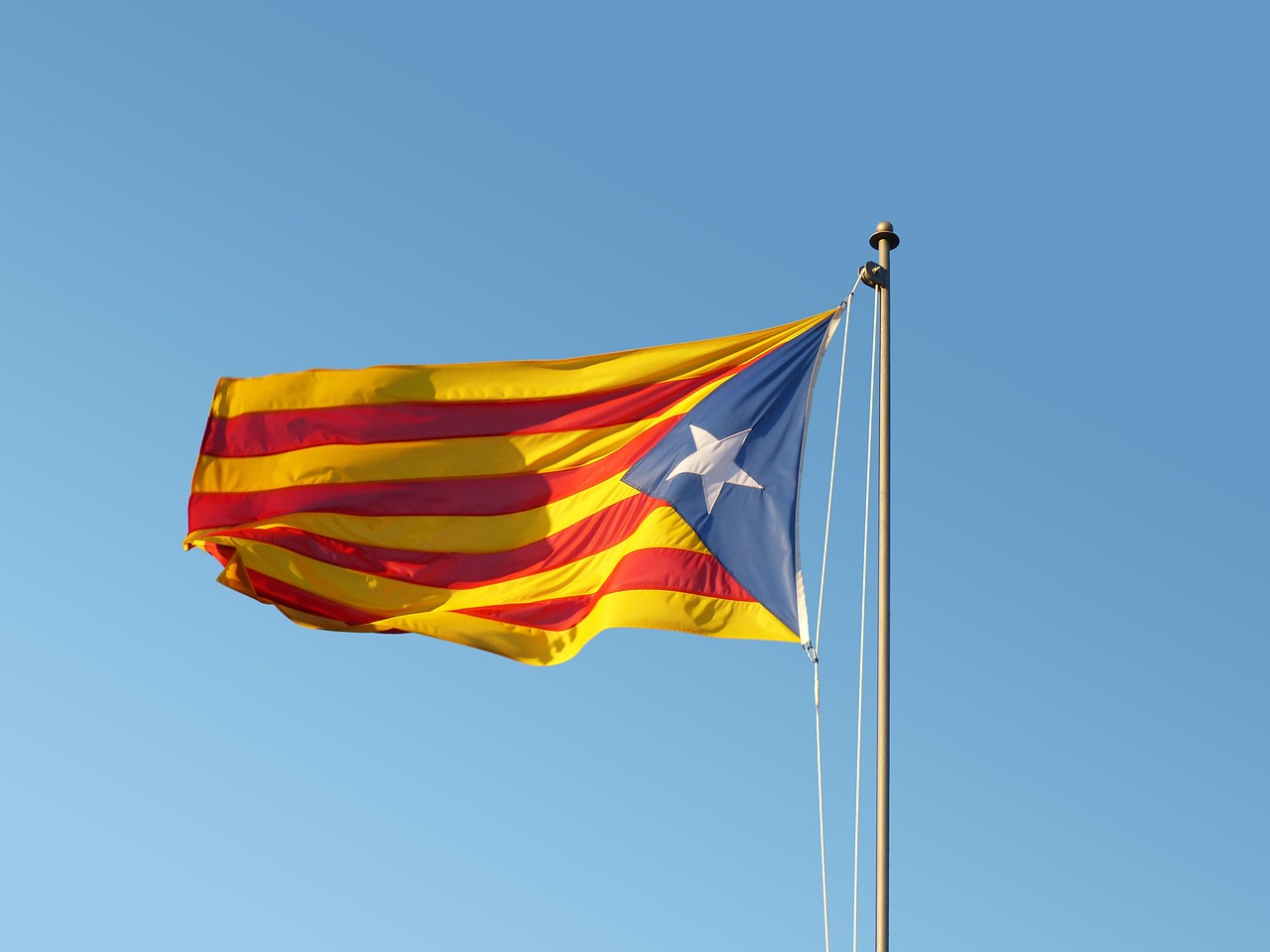
Is it dangerous to live in Barcelona?
It’s not dangerous to live in Barcelona. I’ve been here for three years, all of our guides have been here for at least that amount of time, and we have never had any trouble whatsoever.
Over the last two years, there have been some protests, but living in Barcelona is completely safe. I used to live in London, and Barcelona feels—to me, anyway—much safer than London.
What has taken place in Barcelona in recent years to lead up to the protests?
Two years ago, the pro-independence government conducted a referendum. That referendum was illegal—it was not sanctioned by the Spanish state, so therefore it had no legal bearings at all. The Spanish state tried to stop the referendum from happening, and on the morning of the referendum, there was some violence—mainly from police to protestors, but also the other way around as well.
Three weeks after this referendum, [Catalan then-president] Carles Puigdemont—the man you’ve seen in Belgium and Germany who is now trying to get to Canada—declared Catalonia an independent state. Now that was highly illegal. It was after this point that Carles Puigdemont and some other politicians left Spain and others stayed.
Those that stayed have been in pre-trial detention for the past two years, and that trial has just finished. The sentences were announced two weeks ago. It’s these sentences which have caused some protests and some small violent protests.
The sentences passed down to the politicians ranged from nine to 13 years [in prison]. Many people saw it as a bit harsh and too heavy-handed. This is why there have been protests—they’re responding to what they see as far too harsh sentences.
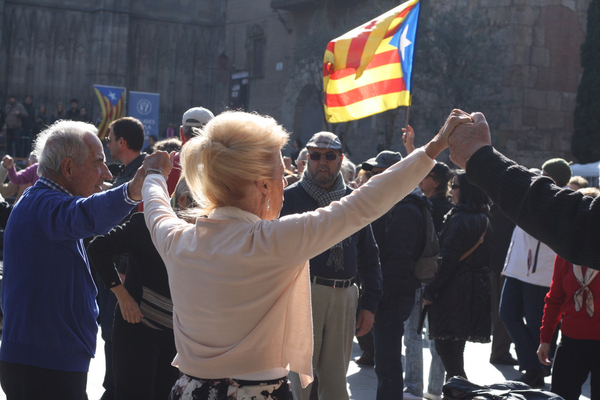
Are there certain areas that people need to avoid when visiting Barcelona?
There are no areas that you need to avoid on a normal visit to Barcelona. If you have the recent protests in mind, there haven’t been any during the day. So until about 8 or 9 p.m., everywhere is perfectly fine with no blockages at all.
After 9 p.m., you may see some streets cut with a peaceful protest happening. These are usually students having a sit-in, or that kind of thing. Those protests tend to be focused around government buildings and other buildings of the state. So on TV, you may have seen that a police station has been the center of some of these protests, and that’s on Via Laietana. Sometimes late at night that police station has people outside, but very peaceful, and to be fair, there have been none there the past few nights.
Other areas which can be subject to some protests—always peaceful—are the southern corner of Eixample, near the corner of Carrer Mallorca and Pau Claris. There are some government buildings up there. Occasionally on my way home from work on my scooter, I have to go a longer way around because the streets have been cut, but the police are really in control. And as I’ve been saying, these protests are peaceful.
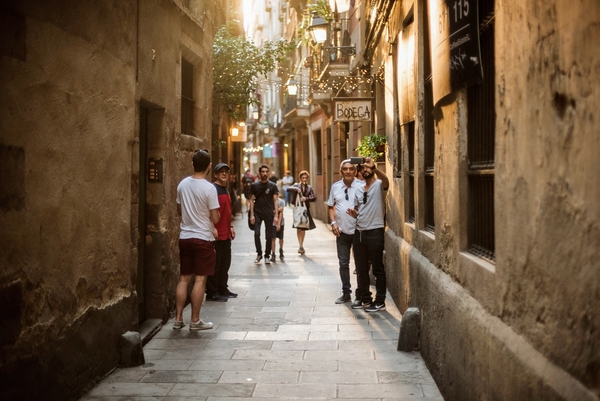
Is there anything happening in the main tourist areas, where our guests are spending most of their time?
The Gothic Quarter and El Born are the two main tourist areas. This is where we give some of our tours like the Tapas, Taverns and History and Tastes and Traditions, which goes from Born into Barceloneta. These tend to be completely free of certainly any violent protests. They also seem to be free of most of the protests in general.
The main protests are taking place in the Eixample. As far as tourists are concerned, that’s where your hotel might be, but during the day, you’ll be nowhere near there. You’ll be in the area which is completely empty of protests, so you’ll be absolutely fine down there.
Have the recent protests affected Devour Barcelona’s tours?
To the best of our ability, we’ve been able to run tours throughout all of these protests. The only day when our tours were really affected was on the Friday [October 18] of the main protest week, and that was for the strike. Some of our tour partners weren’t open. That’s the only reason we’ve had to actually stop tours in Barcelona. At no point have we had to stop our tours because of violent protests, so you’re completely safe coming with us on our food tours.
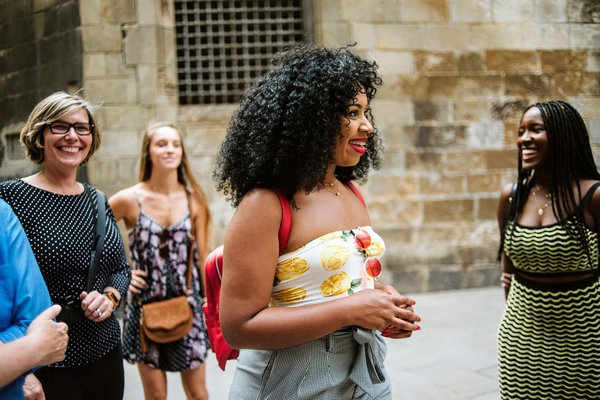
Do you think the protests will die down soon? What should upcoming visitors expect?
The protests have already started to die down. In fact, this past week [of October 31] has seen very, very few protests whatsoever. Last night, near my house—I live up in the Eixample where many of the protests are—there were some students protesting on Diagonal, one of the main roads that runs through Barcelona, but it was completely peaceful.
The last major “violent” protests happened about 10 days ago [as of October 31]. By that point, the actual violent element was only about 20 or 30 people, literally, at Plaça d’Urquinaona.
The peaceful protests, I imagine, will be maintained. However, they will only take place if there is something relevant in the news about the “procés” and about the prisons. The actual week to 10 days of planned protests has come to an end.
Who are the people who are causing violence? Is it the majority of the protestors?
In the independence movement, 99.99 percent of protestors are peaceful. They would say that 100 percent of independence supporters are peaceful. In the independence movement, there’s a saying that the violent protestors do not represent the independence goals.
Now the reality is, of course there are some. But it is such a tiny, tiny percentage as to be completely negligible. El País, one of Spain’s main daily newspapers, has interviews on their English site with four or five people who took part in the protests. The reasons these people gave for being in the protests were anything but independence. Many just felt disenfranchised from Spain and the Spanish state. They feel that the economic conditions in Spain at the moment are too hard for young people like themselves. Some of them were angry at the sentences handed down to the politicians, but they made it clear that they weren’t pro-independence—they were just angry that politicians could be sent to jail for 13 years essentially for just holding a referendum. Obviously it’s more complicated than that, but they do feel that 13 years is too harsh.
So the violent element is a very tiny percentage of independence protestors. The majority are just young people who are angry at the country for, as they see it, injustices and not having the opportunities that their parents had.
Are there any actual solutions besides full independence or revoking autonomy?
There are always options other than the two extremes. The independence movement would love to be independent. However, I’ve lived in Barcelona for three years and I actually taught English before becoming Operations Manager for Devour Barcelona. Some of the favorite conversation topics among my students were Brexit and independence in Catalonia.
Many people I spoke to who support independence would actually just be happy with, as they would see it, a fairer financial arrangement between Catalonia and Spain. Catalonia pays a lot more into the Spanish pot, probably because Catalonia is one of the wealthiest regions of Spain. But also, the system is set up so that they do pay a higher level of tax. Catalans pay a higher level of income tax than other parts of Spain, and this is viewed as unfair.
So from my perspective—and I’m not speaking for Devour here—there is another way out of this. It’s essentially to renegotiate the agreement between Catalonia and the Spanish state to make financing fairer amongst all, and crucially to let Catalans speak Catalan. In general, they are allowed to do so, but some governments—namely the [right wing] Partido Popular—like to prod and probe the Catalans a little bit when they’re in power, telling them that they’re going to ban Catalan in schools. Which, for the Catalans, just gives them memories of the Spanish Civil War when they weren’t allowed to speak Catalan in Catalonia.
So for me, a fairer financial arrangement and leaving Catalan alone would cause most independence support to actually die down. The other option is to actually give them a referendum. In no single official poll has the independence movement won the majority, ever, other than the referendum held two years ago where most unity supporters stayed at home because they didn’t want to give legitimacy to the referendum. The highest amount of support that independence has hit is about 48.7 percent.
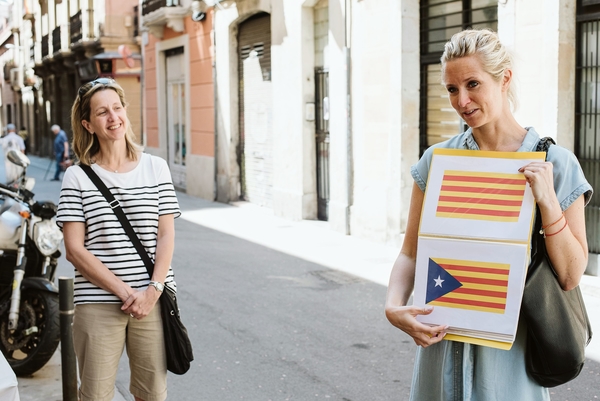
Are the peaceful protests usually publicized so people are aware?
You can find them through the CDR hashtag or handle—that’s the Committee for the Defense of the Republic. Now they also have some more lively protests, but you’ll be able to find out where they’re planning to be. ERC, one of the independence parties, also advertises when they know there will be planned peaceful protests so you can find out. Twitter is a fantastic tool for this. Just search “Catalunya” or “manifestaciones Catalunya” and you’ll be able to find any planned protests.

